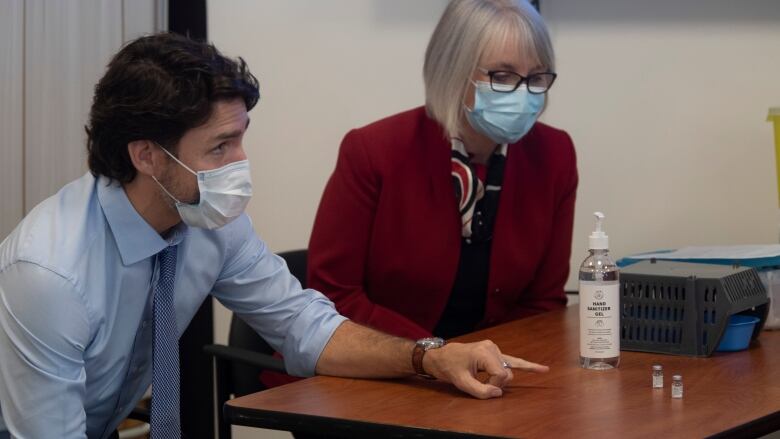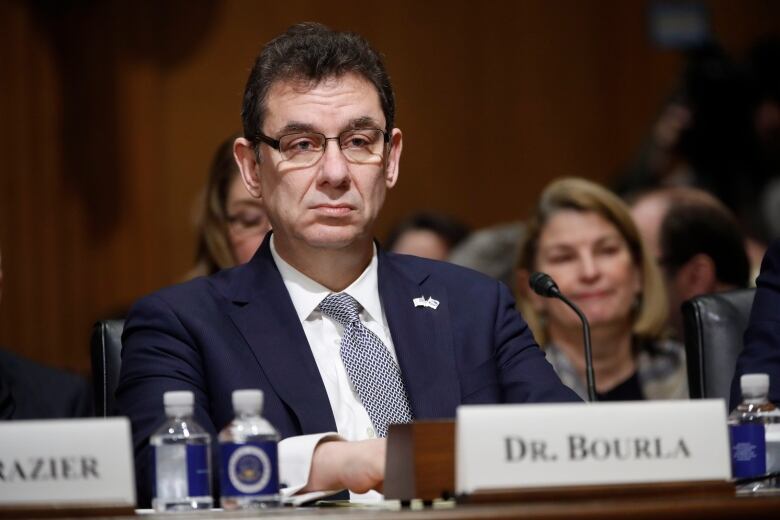Trudeau says Pfizer CEO assured him that vaccines will arrive in February
'The next few weeks will be challenging when it comes to deliveries,' Trudeau says

Prime Minister Justin Trudeau said today the CEO of Pfizer has personally assured him that the pharmaceutical company will send vaccine shots to Canada next month.
The promisefrom Dr. Albert Bourla, the company's top executive, comes after Canada learned it wouldn't receive a single vial of the highly effective vaccine next week, as Pfizer pauses some deliveries while itretoolsitsBelgian manufacturing plant.
Maj.-Gen. Dany Fortin, the military commander leading vaccine logistics for the Public Health Agency of Canada (PHAC), has said Pfizer's deliveries will be reduced by up to 50 per cent over a four-week period, punting as many as 400,000 doses to a later date.
The delivery delay is already prompting some provinces notably Alberta and Ontario to warn that they will have to curtail vaccination appointments in the weeks ahead as they directtheexisting supply of the two-dose Pfizer vaccineto patients who need their second shots.
"The next few weeks will be challenging when it comes to deliveries," Trudeau told reporters. "That said, Dr. Bourla assured me that hundreds of thousands of Pfizer doses will be delivered the week of February 15and in the weeks to follow."
Trudeau said that, despite the delivery hiccup, the company still expects to meet its promised delivery targetof four million dosesby the end of March enough shots to fully vaccinate 2 million Canadians.
Trudeau's call with Bourla is theprime minister's first known personal intervention in vaccine deliveries.
When asked Tuesday if he would lobby Pfizer to send more doses, Trudeau said Public Services and Procurement Minister Anita Anand was the lead on the file.
The prime minister of Israel has had more than a dozen phone conversations with the CEO of Pfizerand the president of the European Union has personally reached out to the company's leadership.
Pfizer isn't treating every customer the same way. While Canada will receive no doses next week, the company said it "will be back to the original schedule of deliveries to the European Union beginning the week of Jan.25."

Pfizer is grappling with unprecedented global demand for its vaccine as the world scrambles to inoculate patients against the deadly novel coronavirus.
While the company had projected it could manufacture up to 1.3 billion shots this year alone, it is now shifting gears to pump out even more.
The company is making upgrades to its Belgian plant so that it can manufacture up to two billion doses this year. In order to complete those upgrades, some production lines will have to be idled and Pfizer won't have enough vials to go around in the short term to meet its previously promised delivery schedule.
500,000 Moderna shots to come in February: Trudeau
Beyond the Pfizer product which, to this point, had been delivered weekly Canada is expecting shipments of the Moderna product to continue uninterrupted. Trudeau said about 500,000 Moderna shots will be delivered to Canada in February. The Moderna doses are to be delivered every three weeks.
In addition to the two vaccines already approved, Health Canada regulators arereviewing clinical trial data for both theAstraZeneca and Johnson & Johnsonproducts.
Canada has placed orders for doses from these companies Canada has options for up to 20 million doses from AstraZeneca but a delivery schedule is far from certain because the regulatory review is still underway.
The U.K. approved the AstraZeneca vaccine on Dec. 30.The U.K. has been a world leader in getting shots into the arms of patients. Nearly 9per cent of people living in the U.K. and Northern Irelandhave received at least one dose so far.

The product from Johnson & Johnson's pharmaceutical division, Janssen, has not been approved for use anywhere in the world. Some countries are eager to secure doses of this vaccine because it only requires one shot. Canada has signed anagreement for up to 38 million doses of this product.
The company has not yet publiclypresentedany final data on its effectiveness, although early results,published in the prestigious New England Journal of Medicine, are promising.
Dr. Mark McClellan, the former U.S. Food and Drug Administration (FDA)commissionerand a member of Johnson & Johnson's board of directors, has said he expectsthe company to produce more than100 million doses of that shot for the American market by April.
'No unexpected vaccine safety issues,' Tam says
Dr. Theresa Tam, Canada's chief public health officer, said PHAC has been monitoring the vaccine rollout for any significant adverse medical events following immunizations.
With some 700,000 shots administered so far, the department had documented just 90 such events nationwide as of Jan. 15.
An adverse event is defined as a medical problem that happens during or after treatment with a vaccine. These problemsare not necessarily caused by the vaccine itself, Tam said.
Of the 90 reported adverse events, 27 were considered serious they includedsevere allergic reactions, Tam said. Based on that data, the probability of someone experiencing a severe medical side effect post-vaccination is just 1 in 22,000.
"To date, no unexpected vaccine safety issues have been identified," Tam said.













_(720p).jpg)


 OFFICIAL HD MUSIC VIDEO.jpg)
.jpg)



























































































